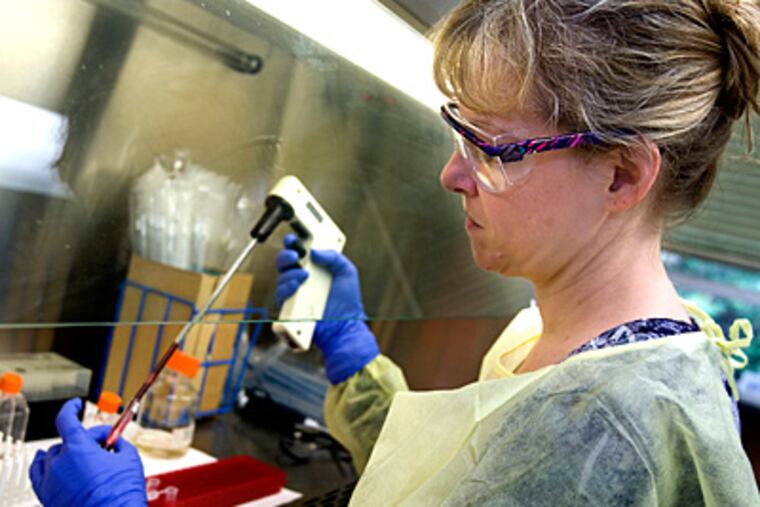Flea-related bacterial infection raising new concerns

By Sarah Avery
McClatchy Newspapers
(MCT)
RALEIGH, N.C. — A bacterial infection typically spread by fleas, lice and biting flies could be more prevalent than many think, and may have been transmitted from a mother to her children at birth, scientists from N.C. State University say.
Dr. Edward Breitschwerdt, an infectious disease veterinarian and one of the world's leading researchers of bacteria called Bartonella, has for the first time documented evidence that the pathogen may have been passed between family members.
Although more studies are needed to back up his findings, Breitschwerdt and colleagues describe the case of a mother and father who began battling chronic aches, fatigues and other symptoms soon after they were married. When their twins were born in 1998, the daughter died after nine days from a heart defect, and the son developed chronic health problems.
Using tissue from the daughter's autopsy and blood from the surviving family members, Breitschwerdt's team discovered that the entire family was infected with the same species of Bartonella bacteria, despite having no shared exposures to flea or lice infestations. Bartonella is known to causes such illnesses as trench fever and cat scratch disease, and it is increasingly suspected of triggering a variety of aches and inflammations that doctors have been unable to diagnose.
"I think we have stumbled across something that is of monumental medical importance," said Breitschwerdt, whose findings were published recently in the Journal of Clinical Microbiology.
Proving the mother-child transmission could be difficult, however. Little funding is available for such research because the bacteria are still not considered a major source of human disease.
Dr. Michael Kosoy, who heads the Bartonella laboratory for the Centers for Disease Control and Prevention in Fort Collins, Colo., said scientists are only beginning to build evidence that Bartonella infections may be more common than previously thought.
"Bartonella are circulated around the world in many animals, but there are different Bartonella species, and the question is how can they be transmitted to humans?" Kosoy said, noting that most known cases have been transmitted from biting insects. He said the NCSU findings about the potential family transmission is compelling but inconclusive.
DOZENS OF STRAINS
At least 26 strains of Bartonella have been named worldwide, and the list is growing. The most notorious Bartonella infection is cat scratch disease, a fever illness passed to humans from flea-infected cats. Fleas are the primary hosts, and they spread the bacteria in their feces.
Other Bartonella strains spread more serious diseases. Kosoy is studying how often heart inflammation is caused by a Bartonella that thrives among rat fleas in Thailand. He has already established that about 25 percent of unexplained fever illnesses among a group of patients there were caused by Bartonella.
"This is not limited to cat scratch," Kosoy said. "That's just the tip of the iceberg."
Breitschwerdt said he thinks the bacteria may be the hidden cause behind a host of chronic symptoms — muscle aches, neurological problems, fatigue, arthritis — that defy diagnosis.
About two years ago, Breitschwerdt began testing blood samples from a doctor in Maryland, who was curious whether Bartonella infections might be causing problems for some of his patients.
"There are lab tests showing inflammation," but no discernible cause, said Dr. Robert Mozayeni, a Yale-educated rheumatologist who practices in Rockville, Md.
Mozayeni contacted Breitschwerdt and his NCSU colleague, Ricardo Maggi, who together developed a more sensitive test for Bartonella. Routine blood tests fail to detect Bartonella because they search for antibodies that the body is slow to produce.
Instead, Breitschwerdt and Maggi figured out how to cultivate the bacteria in the laboratory from blood samples of infected people. They founded a company called Galaxy Diagnostics to handle the laboratory volume.
Of Mozayeni's mystery patients tested at the lab, nearly 20 percent had Bartonella infections.
"I suspect this is going to be one of the causes of rheumatoid arthritis and a few other things, but it's too speculative right now to say," Mozayeni said.
HUMAN TESTING
More studies are needed, and Mozayeni said he has now joined Breitschwerdt and Maggi in the diagnostic company to oversee human testing.
"Certainly, the prevalence of Bartonella infection in people with chronic illness is higher than I would have ever guessed, but we still don't know what that means," Breitschwerdt said.
Among the biggest unknowns is how to treat people who have been infected. The effectiveness of antibiotics depends on which strain of Bartonella is at work, and with so many strains, treatments can be hit or miss.
Breitschwerdt said the family in his most recent study declined to comment about their experience. He said they were having difficulty finding a doctor to treat them.
"It is very difficult to find a physician who wants to see someone with a chronic illness that is poorly defined," he said, adding that many such patients often think they have Lyme disease, a tick-borne bacterial infection with similar symptoms — and stigma. "With an unexplained illness, it becomes problematic."